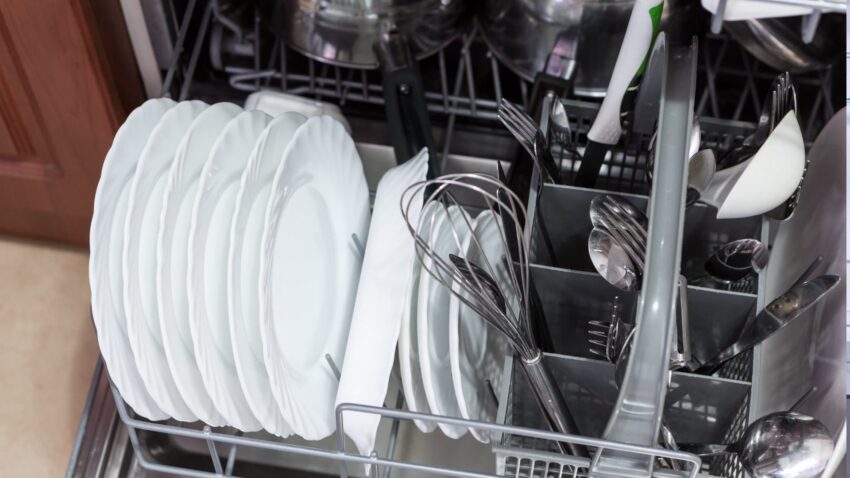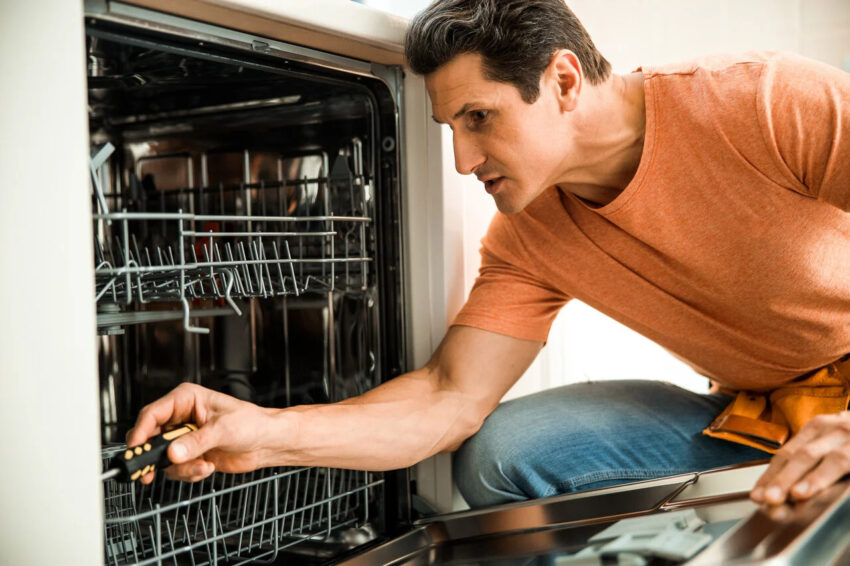
24 May Why Is Your Dishwasher Leaking?
Imagine this: you walk into your kitchen, ready to unload the sparkling clean dishes from your trusty dishwasher, only to find a pool of water on the floor. Frustration sets in as you wonder, “Why is my dishwasher leaking?” A leaking dishwasher can be a source of annoyance and potential damage to your home, but fear not! In this article, we will explore the common causes of dishwasher leaks, how to identify them, and what steps you can take to fix and prevent them. So grab a towel and let’s dive into the world of dishwasher leaks!
Common Causes of Dishwasher Leaks

Image source: Google.com
Faulty Door Seal
One of the primary culprits behind dishwasher leaks is a faulty door seal. Over time, the door seal can become worn out or damaged, leading to gaps where water can escape. If you notice water pooling around the front of your dishwasher, the door seal might be the culprit.
Clogged Drainage System
A clogged drainage system can cause water to back up and leak out of your dishwasher. Debris, food particles, and even hard water deposits can accumulate in the dishwasher’s drains and filters, obstructing proper water flow and causing leaks.
Damaged Water Supply Line
The water supply line connects your dishwasher to the main water source. If this line gets damaged or develops cracks, water can leak out during the dishwashing cycle. Inspect the water supply line for any signs of wear and tear or visible leaks.
Worn-out Hoses or Connections
Similar to the water supply line, hoses, and connections within the dishwasher can degrade over time. Cracked or deteriorated hoses can result in leaks, especially during the dishwasher’s operation. It’s important to regularly inspect these components for any signs of damage or loose connections. By doing so, you can prevent potential issues such as a dishwasher leaking into basement. Keeping an eye out for leaks and promptly addressing any problems will help ensure the efficient and trouble-free operation of your dishwasher.
Malfunctioning Pump or Motor
A malfunctioning pump or motor can lead to irregular water flow or excessive pressure within the dishwasher. This can cause leaks to occur from various parts of the appliance. If you hear unusual noises or notice water seeping out during operation, a faulty pump or motor could be the issue.
Improper Installation
Sometimes, dishwasher leaks can be traced back to improper installation. If the dishwasher wasn’t installed correctly or if the connections were not tightened properly, water can escape during operation. Ensure that your dishwasher is installed according to the manufacturer’s instructions.
How to Identify a Dishwasher Leak
Identifying a dishwasher leak is crucial for understanding the root cause and taking appropriate action. Here are some signs to look out for:
Visible Water on the Floor
The most obvious sign of a dishwasher leak is standing water on the floor surrounding the appliance. If you spot this, it’s a clear indication that something is amiss with your dishwasher.
Dampness around the Dishwasher
In some cases, the leak may not be significant enough to form a visible puddle. Instead, you might notice dampness or moisture around the dishwasher, indicating a slow leak or a minor issue.
Water Stains or Damage on Cabinets or Walls
Over time, continuous leaks can cause water stains or damage to nearby cabinets, walls, or flooring. Keep an eye out for discoloration, warping, or peeling of materials, as these can be signs of a chronic leak.
Unpleasant Odor
Persistent leaks can lead to mold or mildew growth within the dishwasher or surrounding areas. If you detect a musty or unpleasant odor, it could be a sign of hidden moisture and leaks.
Steps to Fix a Leaking Dishwasher
Now that you have identified a leak, it’s time to take action and resolve the issue. Follow these steps to fix a leaking dishwasher:
Turn off the Power and Water Supply
Safety first! Before attempting any repairs, make sure to turn off the power supply to your dishwasher by switching off the corresponding circuit breaker. Additionally, shut off the water supply valve to prevent further leaks.
Inspect and Replace the Door Seal
Carefully examine the door seal for any visible damage, such as cracks, tears, or deformation. If you notice any issues, it’s time to replace the door seal. Consult your dishwasher’s manual or contact the manufacturer for guidance on obtaining a suitable replacement.
Clear Clogged Drains and Filters
Remove any debris, food particles, or mineral deposits that may be clogging the dishwasher’s drains and filters. Rinse them thoroughly and ensure unobstructed water flow. Regularly cleaning these components can prevent future leaks.
Check and Repair the Water Supply Line
Inspect the water supply line for any signs of damage or leaks. If you find any issues, replace the line with a new one. Ensure proper connections and tightness to prevent water from seeping out.
Examine Hoses and Connections
Thoroughly examine all hoses and connections within the dishwasher for cracks, leaks, or loose fittings. Replace any damaged parts and tighten connections as necessary. This step will help eliminate potential sources of leaks.
Repair or Replace Faulty Pump or Motor
If you suspect a malfunctioning pump or motor, it is recommended to seek professional help. These components can be complex to repair or replace, and it’s best to rely on an experienced technician to ensure a proper fix.
Ensure Proper Installation
If you suspect that improper installation is the cause of the leak, refer to your dishwasher’s installation manual or contact a professional installer for assistance. Proper installation is essential for optimal performance and to prevent future leaks.
Prevention Tips to Avoid Dishwasher Leaks
Taking preventive measures can significantly reduce the chances of dishwasher leaks. Consider these tips to keep your dishwasher in excellent working condition:
Regularly Inspect and Maintain the Door Seal
Regularly inspect the door seal for any signs of wear and tear. Clean it with mild soap and water, and ensure a tight seal when closing the dishwasher door.
Clean Drains and Filters
Make it a habit to clean the dishwasher’s drains and filters at regular intervals. Remove any debris or buildup that may cause blockages and affect the dishwasher’s performance.
Check and Tighten Water Supply Line Connections
Periodically inspect the water supply line connections for any signs of looseness. If you notice any issues, tighten the connections to ensure a secure fit.
Replace Worn-out Hoses or Connections
If you notice any deterioration or damage to hoses or connections, replace them promptly. It’s better to invest in new parts than to risk leaks and potential water damage.
Follow Proper Installation Guidelines
When installing a new dishwasher or relocating an existing one, follow the manufacturer’s installation guidelines carefully. Improper installation can lead to leaks and other operational issues.
Conclusion
A leaking dishwasher can be a frustrating and potentially damaging problem. By understanding the common causes, identifying signs of leaks, and taking appropriate steps to fix and prevent them, you can keep your dishwasher running smoothly. Regular maintenance, proper installation, and prompt repairs are key to avoiding leaks and preserving the integrity of your appliance.
Remember, if you encounter complex issues or feel unsure about your repair skills, don’t hesitate to seek professional assistance. A qualified technician can help diagnose and resolve any persistent leaks, ensuring your dishwasher works flawlessly for years to come.
You may like to read HOW TO KILL DRAIN FLIES

Sorry, the comment form is closed at this time.